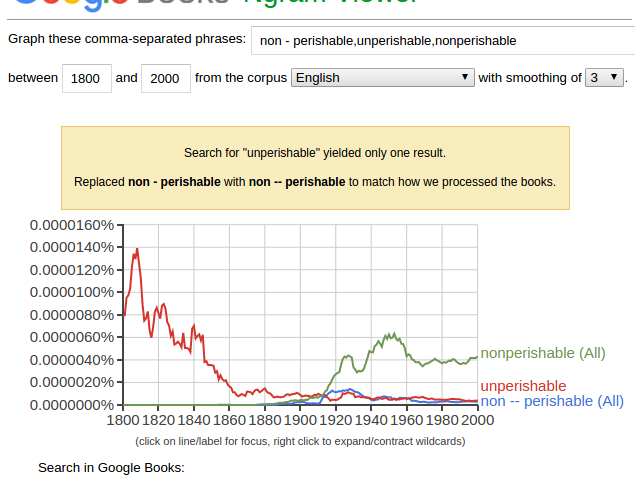Unperishable, non-perishable or imperishable? I'm quite confused about which prefix is used for the opposite of perishable. If more than one is used, what are the differences between them? Searching online did not really give me any answers. I hope someone here can.
2 Answers
Let's look at the common ones first, nonperishable and imperishable:
nonperishable: not subject to rapid deterioration or decay. source
A supply of nonperishable food was kept for emergencies.
Nonperishable and its typically plural noun form, nonperishables, are used for concrete objects, like food, supplies, and medications, that are intended to last a long time.
imperishable: not subject to decay; indestructible; enduring. source
Though Thelonius Monk died decades ago, his imperishable legacy arouses our senses still today.
I mostly see imperishable used in a literary or abstract context. It can also be used for items, but this usage is less common.
Unperishable means the same as nonperishable, but is the least common of all (source). I've never seen it used.
-
Wow! I now know which one to use for what I'm writing. I think its safe to say I won't be using unperishable anymore. Thanks Ash. Commented May 1, 2016 at 6:53
-
But this is readily available to OP; I'm not saying that this isn't more than could be expected from a new visitor, but I am saying that a question with no signs of reasonable research should be close-voted instead of answered. Commented Aug 14, 2016 at 20:11
To add onto the excellent answer above, I got curious about the use of "un" with "perishable", and guessed I would find mostly stylized choices...I did find a few artistic uses.
However, here's what I found out about "un" unto itself (very cool):
This is from: The Un-Believable Un-Verb September 21, 2009 By Ben Zimmer
Check out the whole article at: https://www.visualthesaurus.com/cm/wordroutes/the-un-believable-un-verb/
Ever since Old English, the un- prefix has come in two basic flavors. It can be used like the word "not" to negate adjectives (unkind, uncertain, unfair) and the occasional noun (unreason, unrest, unemployment). Or it can attach to a verb to indicate the reversal of an action (unbend, unfasten, unmask).
Actually, that's a bit of an oversimplification. Yale linguist Laurence Horn, my trusty guide through the thickets of un-, points out that in Old English the two flavors corresponded to two distinct prefixes. On the one hand there was the negative prefix un- (etymologically related to German un-, Latin in-, and Greek a[n]-), and on the other hand there was the reversative prefix on(d)- (related to German ent- and Greek anti-). These two prefixes merged into one form, un-, and they've been semantically intertwined ever since.
So the new un-verbs that I discuss as typifying "The Age of Undoing" owe their legacy to the old reversative prefix on(d)-. But the other prefix in Old English, negative un-, could negate not just adjectives and nouns but some verbs too: unbe, unbecome, and unhappen are all attested in Old English with simple negative meanings ('not be,' 'not become,' 'not happen'). By the Middle English era of Chaucer, these negative verbs had faded away, so unlove (used by Chaucer in his poem Troilus and Criseyde) didn't have the meaning 'not to love' (negative) but rather 'come to no longer love' (reversative). And this is the type of unloving that has been handed down to modern-day country singers like Lynn Anderson ("How Can I Unlove You?").
-
That's really interesting...i love how modern English has roots in Old English or even most other languages for that matter. This just makes me look at prefixes in a whole different light. Now it makes me curious about the origin of the other prefixes in the English language. Commented May 1, 2016 at 7:03

